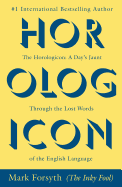
Are you lying awake before dawn, worrying about the day to come? Old English had a word for that: uhtceare. If your worries are too big, you may egrote, or feign sickness in order to avoid responsibility, and stay in bed, browsing Mark Forsyth's Horologicon.
Arranged in the chronological order of the average day, Forsyth's clever tome gathers dozens of the most poetic forgotten words in the English language. From the moment you throw on your pantofles (slippers) and stare blearily at yourself in the tooting-glass (mirror), through your morning aristology (the study of breakfast), the afternoon amell (lunch hour) and the doldrums in which your work is done frobly (indifferently well) at best, Forsyth offers a pitch-perfect way to describe your day.
Perhaps the most delightful element of The Horologicon is that, in addition to presenting some of English's most onomatopoeically apt and wonderfully versatile "lost words," Forsyth comments on their potential uses in ways that range from humorous to downright silly. Happily he does more than just list words like latrinogram (a rumor started in a lavatory), since most of us have a use for such terms, whether we care to admit it or not. After a trampoose (commute) through The Horologicon, few readers will see an ordinary day in quite the same way again. --Dani Alexis Ryskamp, blogger at The Book Cricket

